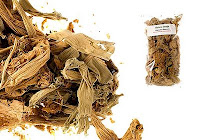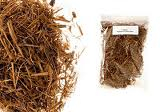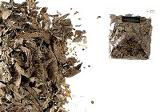The computer magazine PC World recently published a cluster of exposé articles by staff writer Tom Spring, revealing that a number of more-or-less psychoactive plants and plant extracts — many legal and some not — are easily available online. “At a time when authorities are cracking down on illegal sale of steroids and prescription drugs online,” he writes, “substances such as kratom and Mexican prickly poppy, which pack a psychedelic and narcotic-like punch, are flourishing on the Internet.” One doctor with whom he spoke warned, “With some of these substances it’s like playing Russian routlette with your life.”
 |
| Datura inoxia |
There is no doubt that some of the plants the author was able to purchase online can be dangerous. Datura inoxia, for example, contains scopolamine, and a high enough dose of scopolamine can cause, among other unpleasant effects, agitation, delirium with persecutory ideation, and frightening hallucinations. There is no doubt that people can do very weird and self-destructive things after ingesting scopolamine, especially if they are young, naïve, unprepared, and unattended. Horror stories are here.
Still, the author reports, injuries or overdoses related to the ingestion of natural stimulants and hallucinogens are rare. “Emergency room visits are infrequent,” he was told by a hospital pharmacist at the University of California–San Francisco School of Pharmacy. Most emergency room visits stemming from the use of hallucinogens involve bodily harm, the pharmacist said; someone falls down and bruises a bone.
 |
| Banisteriopsis caapi |
The online stores generally state that the products sold are “not for human consumption” or “for incense use only.” The same idea is expressed in different ways — “We do not offer products for human consumption” or “Do not ingest anything from this site.” This wording stems from the provisions of the Federal Analog Act, 21 U.S.C. § 813, intended to ban designer drugs, which at the time were being invented so fast that the law could not keep up with them. Under this Act, any chemical “substantially similar” to an illegal drug in Schedule I or II is to be treated as if it were also in Schedule I, but only if it is intended for human consumption. Hence the disclaimer.
Sometimes specific warnings are appropriately stronger. “Datura is an extremely poisonous plant,” says the site selling Datura inoxia. “There have been many reported fatalities … We strongly discourage anyone who is contemplating ingesting any part of this plant.” Dutch Green Bud smoking mixture, which is made from plants containing leonurine and lactucopicrin, both mild sedatives, is accompanied by the warning, “Do not drive or operate any machinery after using this product.”
Among the plants and plant extracts purchased online by the author were Salvia divinorum, motherwort (Leonurus sibiricus), kratom (Mitagyna speciosa), jurema (Mimosa hostilis), fly agaric (Amanita muscaria ), argemone (Argemone mexicana)), kanna (Sceletium tortuosum), datura (Datura inoxia), ayahuasca (Banisteriopsis caapi), and chacruna (Psychotria viridis). One online store offered, not a plant or plant extract, but what it claimed was the powerfully hallucinogenic 5-methoxy-dimethyltryptamine.
 |
| Psychotria viridis |
All of these, with two exceptions, are, as far as I know, legal. The first exception is Salvia divinorum, which is now illegal in thirteen states, with more presumably on the way. The second exception is chacruna (Psychotria viridis), which contains the Schedule I controlled substance dimethytryptamine, and is illegal everywhere. 5-methoxy-dimethyltryptamine might, under appropriate circumstances, fall within the ambit of the Federal Analogue Act.
The articles, despite their stern warnings about the effects of these plants, and scary videos of teenagers looking really stupid after ingesting Salvia divinorum, yield several ironies. The first is that the author provides links to the online sources of the psychoactive plants and fungi the articles are warning against, making it very easy for the reader to go right ahead and buy them online.
Second, the author submitted the nineteen samples he had purchased to the National Center for Natural Products Research at the University of Mississippi. The reports issued by the NCNPR emphasized all the potential dangers of the plants, but also reported that, with one exception, the plants they tested were exactly the plants they were advertised to be. The one exception was when a substance purported to be the hallucinogen 5-methoxy-dimethyltryptamine turned out to be the muscle stimulant 5-methoxytryptamine.
So the links provided in the articles are not just to online sources for psychoactive plants. They are — with this one exception — links to reliable sources.

- Previous Post: Psychointegration
- Next Post: Indigenous Top-Level Domains
- More Articles Related to: Ayahuasca, Sacred Plants



These plant teachers are wonderful…I use them.
And they help me…truly they do, Do not make heroes out to be villains.
>>>Do not make heroes out to be villains.<<<
I am not at all sure what I said that led you to think I was doing this. Could you elaborate for me?
I would be most pleased if you would browse around the blog, too, which might give you a better idea of how I think of the plant teachers. I would be very interested in your thoughts.